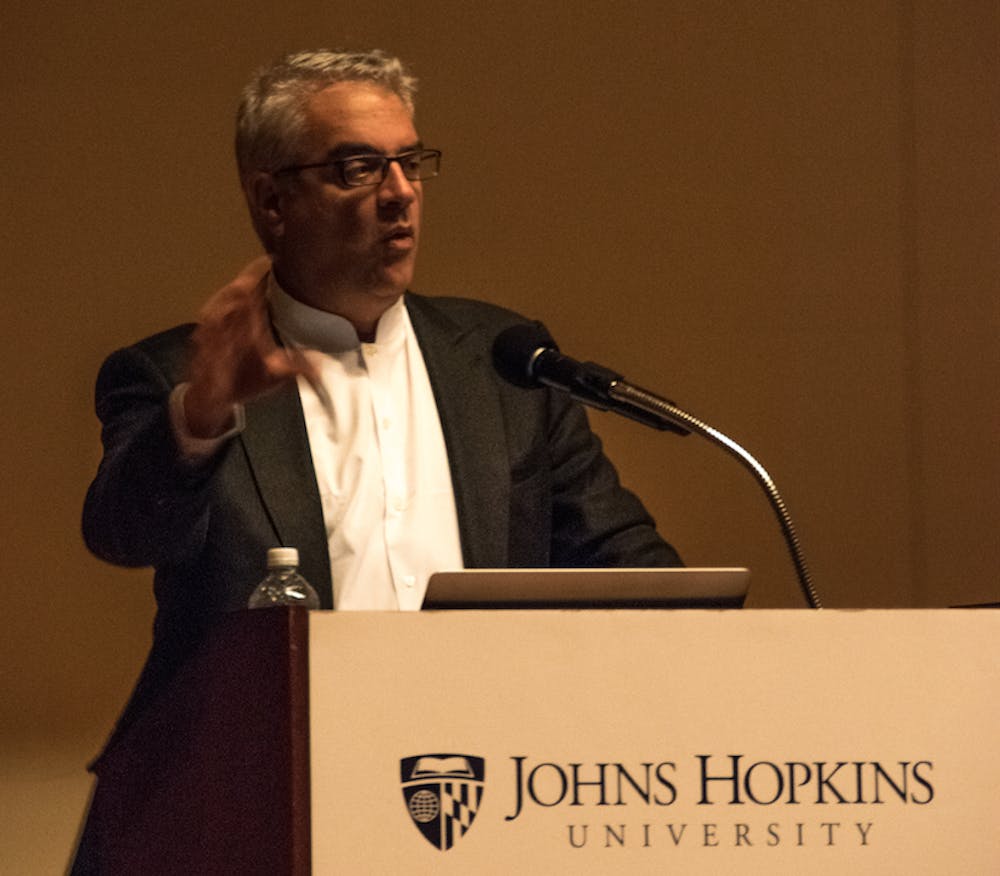Yale Professor Nicholas Christakis gave a talk titled “Social Networks for Good” on Wednesday, Nov. 9 in Shriver Hall. Christakis was hosted by the Milton S. Eisenhower (MSE) Symposium as part of its theme, “Facing Fracture.”
Christakis’ research focuses on biosocial science, network science and behavior genetics. His lecture discussed how and why human beings are all connected and how social networks affect all aspects of the human experience.
“To my eye, these networks are intricate things of beauty,” Christakis said. “They are so elaborate and so complex and so ubiquitous in fact, that one has to wonder, what purpose do they serve?”
Christakis began by exploring the obesity epidemic in the United States. He talked about research suggesting that an individual who knows others who are obese is more likely to be obese himself.
“The fact that people are embedded in social networks and are influenced by the appearances and behaviors of those around them suggested to us that weight gain in one individual might influence weight gain in other individuals to whom they are connected,” Christakis said.
He proposed several explanations for this phenomenon, including induction and homophily. Induction is the idea that one person’s habits have a “domino effect” on those around them, while homophily is the concept that two people with similar habits or lifestyles are more likely to be connected in a social network.
These explanations are implicated in the broader idea of emotional contagion, which Christakis explained is an important characteristic of social networks.
“We’ve seen that emotional contagion is a fundamental aspect of human emotional experience,” he said. “It’s normal human behavior. If someone smiles at you, you smile back.”
Christakis’ experiments found that altruistic behavior spreads through networks and that one person’s behavior can influence another, even when distanced by several degrees of separation.
“How you two treat each other,” Christakis said, “depends on how they treat each other, even though neither of you knows either of them.”
Understanding the results of these experiments allows social scientists to intervene in networks to implement positive change.
In another experiment in Honduras, Christakis and his team analyzed different ways of spreading public health initiatives in villages. They found that when the initiatives were targeted at people with more connections, they spread more effectively than when targeted at random residents.
The structure and function of social networks is implicated in other aspects of society as well.
“These various observations about social network structure and function might be related to what we’ve been seeing in student activism on campus,” Christakis said. “Movements that begin with young people ultimately come to fruition in the whole of our society, in my view making our society better.”
He mentioned an email written by his wife Erika Christakis, also a lecturer at Yale, which encouraged students to maintain an open perspective on controversial Halloween costumes. This letter was met with a student-run campaign to get the Christakises removed from their positions at the university.
“On the Yale campus, there was a huge outpouring of ideas that quickly spread through the network of a college campus,” Christakis said.
He stressed that, despite the distinction between feelings and ideas, students were not able to separate the two because of a social network mentality.
Christakis also emphasized the need to cultivate a sense of individuality and to maintain one’s own ideas and beliefs despite the fact that they may differ from those of the larger network that one belongs to.
To conclude his lecture, Christakis again remarked on the importance of networks and their role in making the world a better place. He introduced the idea of social capital, which hypothesizes that people must make changes to themselves and to each other to yield a higher rate of return.
“If you invest skill and effort, you transform the natural world, you make it more productive and capable of doing things it wasn’t able to do before,” he said.
Students who attended Christakis’ lecture were impressed with his eloquence and extensive knowledge on the topic. Freshman Ananya Reddy attended because she saw the event on Facebook.
“I thought it was really interesting, and I guess I hought about connectivity and things like that before but never as scientifically as it was presented. I think it was a good overview of his research,” she said.
Senior Teddy Kupfer, MSE chair, explained why Christakis had been chosen to speak at Hopkins.
“He’s such a prominent intellectual,” Kupfer said. “His work goes into so many different areas — sociology, politics, psychology, philosophy. So I think it’s important that we get people like that who are original researchers.”





